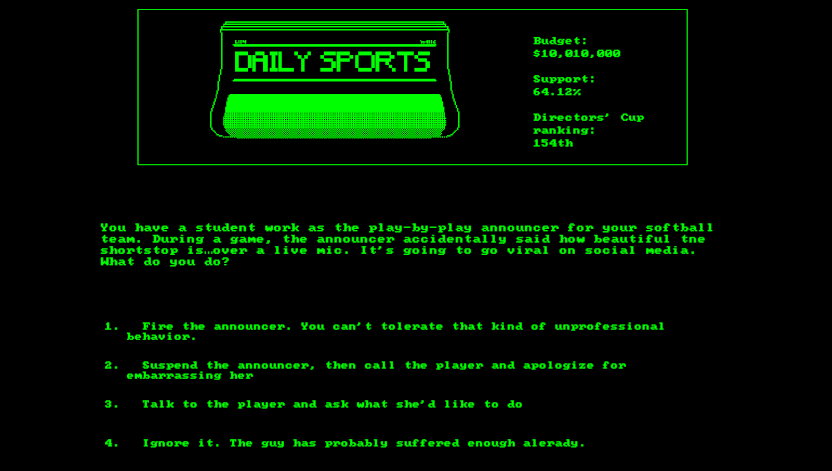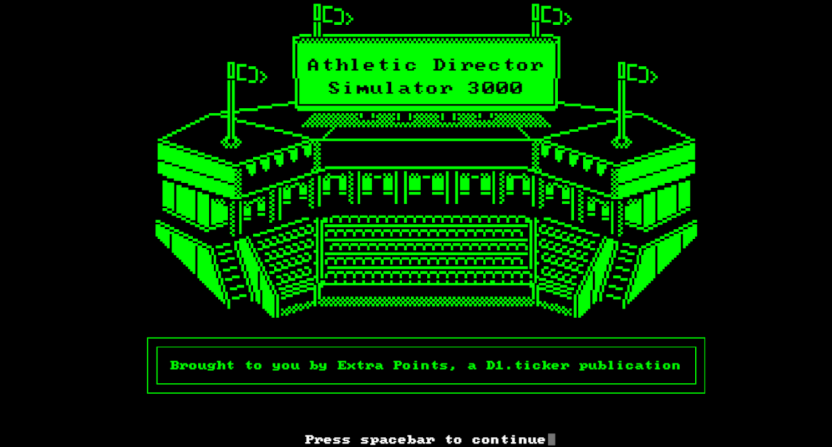There have been many interesting ways to promote journalistic projects over the years, but “creating a video game” stands out. That’s what Matt Brown, the editor and publisher of the D1.ticker Extra Points newsletter on off-the-field issues that shape college sports, has done. On Thursday, Brown released the browser-based video game Athletic Director Simulator 3000, which a release describes as “a love letter to mid-1980s educational computer games, but with a modern twist.”
The text-heavy game puts players in the shoes of an AD at a low-major Division I school, asking them to “manage real-world scenarios while balancing a department budget, fan support, and athletic success.” Managing all that well can see the player gain jobs at mid-major or high-major programs, which face their own challenges. Managing that poorly can see the player fired. The overall goal of the game is “not just to entertain players, but to help readers understand the real complexities of running an athletic department.” Athletic Director Simulator 3000 will be available for free play from Thursday through Saturday, July 22, then will require a paid Extra Points ($8 a month or $75 a year) or D1.classroom (institutional, $20 per student, includes Extra Points, D1.ticker, and more) subscription after that.
Brown launched Extra Points in 2020 after spending almost six and a half years at SB Nation, including as the associate director of college brands. The newsletter was acquired by D1. ticker parent company Drive & Company in 2021, with Brown staying on as publisher. He spoke to AA this week by e-mail about this project and what went into it, and said this was initially just something he was dabbling in as a way to test the Python coding knowledge he was learning.
“I’ve never had the luxury of a stable, institutional sports media job, and I’ve always had to think about new “hooks” I can develop to stay relevant and employed,” he said. “Last year, I got the idea that maybe learning some Python to help with larger data management projects might make me a better reporter, so I’d dabble a little bit at night once I was done writing or reporting. Once I felt like I understood loops and variable storage enough, I ended up making a very, very limited version of the game back in January.”
Brown said the first version of that game was just for fun, and had a lot more silliness. But he and his bosses then had the thought it could be something more.
“It was mostly a joke…the player could earn a higher score by buying institutional subscriptions to Extra Points, you could let Houston Nutt handle your NIL collective, etc. But the response to the joke post was so strong that we started thinking….waitasecond, what if we actually made this a thing?”

At a lot of media companies, the idea of “What if we built a game to promote our journalism?” might not get too far. But Brown said Drive & Company was actually behind the idea of making this a larger thing.
“It’s funny, it was my Drive & Company colleagues that actually suggested it! We have to be good stewards of resources and do all of this in a sustainable way, but it was my bosses who actually pushed me to look into developing the game. They were very supportive of the project, and they originally saw this as a way to market Extra Points and D1.classroom.”
Brown said the current plan for the game is to only include it with newsletter subscriptions, but it might eventually be available as a standalone product if there’s enough interest.
“Right now, we’ve built the game to require an EP or D1.classroom subscription to play after our free trial period ends (July 20-22). We’re doing it that way because that’s the best way to serve our D1.classroom readers, and we’re not sure if we can make the math right, given our audience size, to sell the game on Steam or Google Play or something. If interest in this game is so strong, or if we figure out how to add more features and best support the game in a way that makes a single download make sense…then sure, we’ll put it on Steam, we’ll sell it for ten bucks, we’ll make it a standalone game.”

He said for now, though, Athletic Director Simulator 3000 is a way to promote the newsletter.
“Our core business is a subscription business,” he said. “If this leads more people to read and enjoy Extra Points (kind of like Wordle and the NYT, maybe?) then this will make business sense for us, even if people only subscribe for a month or two. But over time, we’ve tried to build runway into our code and our development schedule to pivot if we need to.”
Launching a game to promote a newsletter is relatively unexpected in any case, but it’s perhaps even more unexpected when it comes from someone who only has limited programming experience. Brown said he had some minor experience building basic games in elementary, middle and high school, but hadn’t done much on that front since, instead focusing on sportswriting.
“I was super into programming and game creation as a little kid…I was really into QBasic in elementary and middle school, I did a lot of goofing off with Adventure Game Studio back in high school ( there are probably some versions of my ****ing terrible games floating around those message boards somewhere. ) But I wasn’t great at math, and by late high school, I gave up on computer science and focused more on writing in English, rather than C++. I probably knew about as much Python as a coding-curious high school freshman…but that was it.”
He said with that in mind, the game construction process here involved a lot of internet searching, and acquiring some help, especially when it came to balancing working on this with his regular reporting and writing work.
“I was constantly googling how-to-do certain things, and we worked with a freelancer named Chris Hatten, who helped turn our crappy Python and my pseudo code into a more stable architecture in Construct 3 and Java. Hatten also did all of the art for the game. The music was originally made by college football Twitter favorite CuppyCup. …It took us a while to figure out what language and environment we wanted to use for this, and what were the sorts of things I needed to do, vs what we needed to pay somebody to do…since I’ve still been writing and reporting for Extra Points, writing D1.classroom questions, and doing the rest of my job. Even now, as we release the game, I’m smart enough to know there are still so many things I don’t know about games, tools, best practices, etc.”
Brown said he still put a ton of time into this, but was okay with juggling that and his regular work.
“It’s been a major commitment…dozens and dozens of hours of writing questions, tweaking game balance, digging into message boards and Reddit, etc. It felt like a part-time job at some points…but I’ve never been great at sticking to *one* project or limiting myself to 40 hours a week. Once I got the directive to really try to make this into a GAME game, I threw myself into making it the best project I could given my abilities.”
As mentioned above, the game has the goal of being educational (especially on the issues faced by athletic directors at these various levels of schools) as well as entertaining. Brown said that was a key goal for Drive & Company here, and the student audience was actually the initial target for the full version of the game.
“The major economic driver for this project is D1.classroom. That’s our college curriculum supplement package that we sell…we roll Extra Points, weekly classroom discussion questions, D1.ticker, and Collegiate Sports Connect (a Linkedin-like college sports industry community) into one package, and sell that to students and professors. We’re working with dozens of schools right now and hope to keep growing the program, but we’re always looking for ways to make that bundle more attractive to students. We figured a computer game would be a great way to explain many of the biggest issues in college sports today, so that was the initial target audience for the entire project. It wasn’t until later that we realized that our non-student audience was also really interested in the game.”

Brown said the game still incorporates humor and entertainment, but the idea is for it to have a lot of connection to those real-world challenges faced by ADs. And part of making that work was getting feedback from ADs and other industry experts.
“If I was just writing a game for my non-industry, non-student audience, it would probably be sillier. There’s still the Extra Points sense of humor and voice in ADS3000, but it’s very much grounded in the realism of the industry. We want it to be fun, we want people to play it multiple times….but these are real world scenarios with real world outcomes, and we wanted that to be a focus. We ran this game by sitting athletic directors, search firm executives, other reporters, industry consultants, sports agents, academics…all kinds of experts. And I’ll keep doing that.”
The latest
- Exclusive: Famed travel baseball coach Nelson ‘Coach Nelly’ Gonzalez talks partnering with Perfect Game for podcast
- Jason Kelce hire solidifies ‘Monday Night Football’ as ESPN’s premier program
- Paul Bissonnette and Anson Carter on covering former NHL on TNT colleague Rick Tocchet: ‘It’s been easy to pump his tires.’
- Exclusive: Michael Davies is stepping back from regular Men in Blazers appearances
“I readily admit, this isn’t as complicated (yet) as say, Football Manager. It’s not a AAA title. But I think you can tell by playing this game that it wasn’t a throwaway joke…that real thought, effort, and love went into it, and seeing that light go off when people play it for the first time has been really rewarding. The retro vibe, audio, MECC/Oregon Trail/Apple IIe iconography and everything…people seem to really positively respond to that too.”
And he’s optimistic that will translate to a good wider reception, and hopes to keep building on the game going forward.
“I hope people enjoy it! We’re planning on adding new scenarios and tweaking the game balance constantly this season, and since the scenarios (and their results) are partly randomized, no two playthroughs will be exactly the same, even if you make the exact same decisions. I hope to keep growing the game, adding to its complexity, art, and features, over the coming months, and am happy to talk to people who want to be involved in that.”
Brown said the specific circumstances around the focus of Extra Points and D1.classroom paved the way for this particular project, but he thinks games of some sort might be a logical part of marketing for more publications than just his.
“I do think that any subscription-driven publication or offering has to always think about ways to add value. That might be with a community, with classes or courses, with bonus content, or something else. I don’t know if everybody has the interest, ideas and level of internet brain poisoning to try this particular idea, but I don’t see why games can’t be part of a strategy for other outlets.”
Athletic Director Simulator 3000 can be played here.






